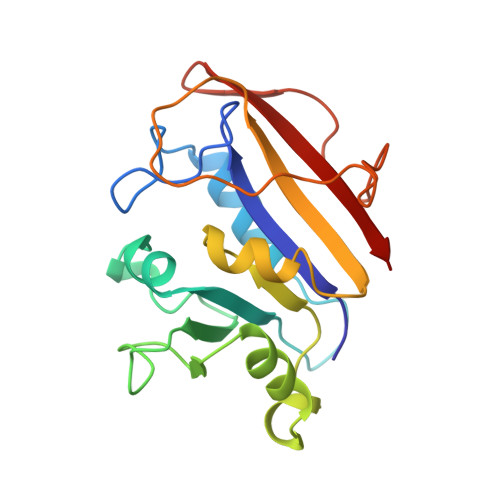Comparison of ternary crystal complexes of F31 variants of human dihydrofolate reductase with NADPH and a classical antitumor furopyrimidine.
Cody, V., Galitsky, N., Luft, J.R., Pangborn, W., Blakley, R.L., Gangjee, A.(1998) Anticancer Drug Des 13: 307-315
- PubMed: 9627670
- Primary Citation of Related Structures:
1HFP, 1HFQ, 1HFR - PubMed Abstract:
The novel furopyrimidine, N-[4-[(2,4-diaminofuro[2,3-d]pyrimidin-5-yl)-methyl]-methylamino] -benzoyl]-L-glutamate (MTXO), a classical antifolate with weak antitumor activity compared with methotrexate (MTX), has been studied as inhibitorcofactor ternary crystal complexes with recombinant Phe-31 to Ser (F31S) and Phe-31 to Gly (F31G) variant human dihydrofolate reductase (hDHFR). Kinetic data show that the binding affinity of MTXO is significantly weaker for the variant hDHFR enzyme than for the wild type enzyme. Structural data for the Phe-31 variants, along with wild type hDHFR, provide the first direct comparison of the binding interactions of a single antifolate in a family of variant hDHFR. These ternary hDHFR complexes crystallize in the rhombohedral space group R3, isomorphous to that reported for wild type hDHFR MTXO-NADPH ternary complex. MTXO binds with its 2,4-diaminofuropyrimidine ring interacting with Glu-30 in hDHFR. The greatest change on modification of the side chain at position 31 is loss of hydrophobic contacts to the inhibitor, which results in the significant decrease in binding affinity of MTXO for the Phe-31 variants. The presence of the 6-5 furopyrimidine ring instead of the 6-6 pteridine ring causes a different bridge conformation compared with MTX, and in the case of the wild type MTXO complex also results in weaker hydrophobic contacts to Phe-31 than observed for MTXT. For the design of antitumor agents related to MTXO, increasing the bridge of MTXO from two to three or four atoms should provide increased DHFR inhibitory potency and antitumor activity.
- Hauptman-Woodward Medical Research Institute, Inc., NY 14203, USA. cody@hwi.buffalo.edu
Organizational Affiliation:


















